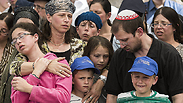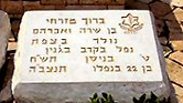

Israel Police Chief Superintendent Baruch Mizrahi was killed in a terrorist shooting attack in the West Bank last year while driving to a Passover Seder with his family. Only after his death did his widow, Hadas, learn that her husband was named after an Irgun fighter who was killed in 1948, chillingly close to the same date.
"Baruch never told me about the origin of his name," Hadas says of her husband, who served for more than 20 years in the Israel Defense Forces' Intelligence Corps before being drafted into the police's Intelligence Department. "His mother decided to tell me only at the funeral that he was named after the Irgun fighter – and that they shared the same destiny."
On the eve of the War of Independence, one of the pre-state Jewish underground's most fascinating fighters – an Arab from Safed who converted to Judaism and chose the name Baruch Mizrahi – was murdered near Jenin. Some 19 years later, his former comrade-in-arms, Haim Mizrahi, decided to name his newborn son Baruch, in memory of the fallen Irgun fighter. Baruch Mizrahi the Irgun fighter was killed on ninth of the Hebrew month of Nissan; Chief Superintendent Baruch fell on the fourteenth day of Nissan.
The "original" Baruch Mizrahi was a very active undercover Irgun operative whose final mission took place on April 18, 1948, when he was sent to Jenin to plant a car bomb in the headquarters of the Fawzi al-Qawuqji, the commander at the time of the Arab Liberation Army.
Mizrahi took an Arab bus to Jenin but his cover was blown when he was recognized at a roadblock on the outskirts of the city. He was executed shortly thereafter and his body was dumped in the area. His remains, which were discovered only some 21 years later in a cave, were eventually buried in the Netanya military cemetery.
"You were born an Arab and became a Jew who loved Israel; you were raised as a Muslim and became an observant Jew," said Mizrahi's former Irgun commander, Menachem Begin, at the burial ceremony.
"You had a great love for our nation and its fighters, and we loved you. And now, standing at your grave, in the name of all the Irgun commanders and soldiers, I salute you, our sacred hero."
Hadas Mizrahi says she knew that her father-in-law was an Irgun fighter, but that the family had never spoken about it. She now plans to visit the grave of the fallen Irgun fighter in Netanya, for herself and on behalf of her late husband too.
"I think about their shared destinies; they had so much in common," she says. "They both fought for the nation of Israel in the field of intelligence; both were murdered by Palestinians in Judea and Samaria, and at the same time of the year. I want very much to learn as much as possible about the Baruch my husband was named after."
Hadas Mizrahi was invited to lay a wreath on Memorial Day on behalf of the widows of fallen members of the Israel Police.















